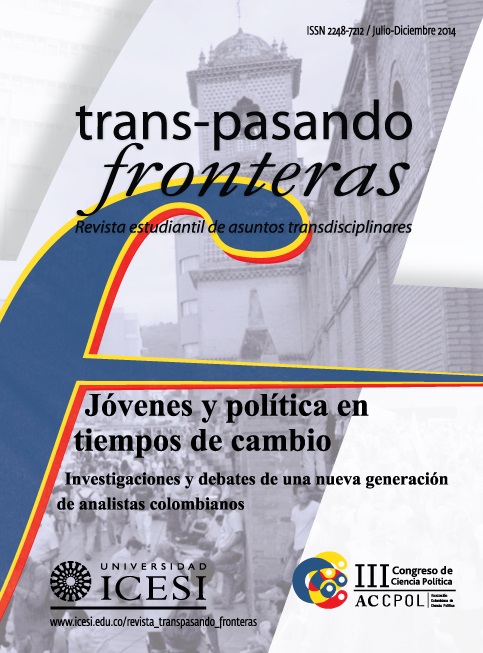Collective action, political identites and armed conflict: the ethnization of a black community in the norte of the Cauca
DOI:
https://doi.org/10.18046/retf.i6.1938Keywords:
Collective action, Ethnic fronteir, Social process of the civil war, North of Cauca region, Afrocolombian people,Abstract
This article aims to analyze the production process of nonviolent collective action in a Afro-Colombian community in response to the social, political, environmental, labor conflicts that have jeopardized their stay in the territory. The artvile presents elements of analysis of ethnographic work conducted by the author in 2012 and 2013 in the municipality of Santander de Quilichao are presented. The theoretical development of the paper takes the concept proposed by Elisabeth Wood on “social processes of the Civil War” (2010) to establish correspondences between social dynamics generated by conflict –increased since 2008 in the region– and processes of collective action and identity agency of Afro-Colombians. Some of these conflicts are territorial tensions between different social actors in the processes of legalization and expansion of ethnic territories, mining, the process of Land Consolidation; and the strengthening of interethnic organizational alliances, and organizational process of black communities in the area. Under these conditions, the narratives of “ancestral”, “being black” and “autonomy” have become guiding axes of collective action that legitimizes the territorial presence of the study community and its demand in the access to rights such as collective ownership and consultation.
Downloads
References
ERAZO GÓMEZ, A. (2012). “La Ley 70 de 1993 y la participación política de las comunidades negras”. En: Trans-pasando Fronteras, núm. 2, pp. 31-45. Cali, Universidad Icesi.
BARTH, F. (1976). “Introducción”. En F. Barth, Los grupos étnicos y sus fronteras. La organización social de las diferencias culturales (págs. 9-49). Ciudad de México: Fondo de Cultura Económica.
COHEN, J. (1995). Estrategia e identidad. Nuevos paradigmas teóricos y movimientos socials contemporáneos. (6), 15-69.
CONSOLIDACIÓN. (s.f.). Consolidación. Recuperado el 2014 de mayo de 20, de http://www.consolidacion.gov.co
GOLDSTONE, J., y Tilly, C. (2001). “Threat (and opportunity): popular action and State response in the dynamics of contentious action”. En R. Aminzade, y y. otros, Silence and Voice in the Study of Contentious Politics (págs. 89-195). Nueva York: Cambridge University.
GROS, C. (2010). Nación, identidad y violencia. Bogotá: IEPRI, Universidad Nacional de Colombia, Universidad de los Andes.
ISACSON, A. (2012). Consolidating “Consolidation” Colombia’s “security and development” zones await a civilian handoff, while Washington backs away from the concept. Washington: Washington Office on Latin America (WOLA).
MELUCCI, A. (1994). “Asumir un compromiso: identidad y movilización en los movimientos sociales”. En: Zona Abierta, 153-179.
MELUCCI, A. (2002). Acción colectiva, vida cotidiana y democracia. Ciudad de México: El Colegio de México, Centro de Estudios Sociológicos.
POLLETA, F., y Chen, P. C. (2012). Narrative and Social Movements. The Oxford Handbook of Cultural Sociology.
POLLETTA, F. (1998). “Contending Stories: Narrative in Social”. Qualitative Sociology, 21(4), 419-441.
RESTREPO, G. I., García, P., y Bautista, S. y. (2010). ¿Un índice de riesgo de las acciones colectivas emprendidas en las zonas rurales? En: Contra viento y marea. Acciones colectivas de alto riesgo en zonas rurales colombianas 1985-2005. Bogotá: La Carreta Editores, IEPRI.
TARROW, S. (1997). “Explotación y creación de oportunidades”. En T. Sydney, El poder en movimiento. Los movimientos sociales, la acción colectiva y a política (T. p. Resines, Trad., pp. 147-178). Madrid: Alianza Editorial.
Entrevistas
CAPAZ, E. (2012). Situación de DDHH en el norte del Cacua. (M. J. López, Entrevistador).
LOBOA, E. (octubre de 2013). Perpepciones e historia del proceso organizativo. (M. J. López, Entrevistador).
MINA, A. (octubre de 2013). Perspeciones sobre proceso organizativo. (M. J. López, Entrevistador).
Downloads
Published
Issue
Section
License
Trans-pasando Fronteras provides immediate open access to its content on the principle that making research freely available to the public supports a greater global exchange of knowledge.
© Authors hold copyright and publishing rights without restrictions but in accordance with the CC license.
All the material in this publication can be reproduced as long as reference is made to title, author and institutional source.







